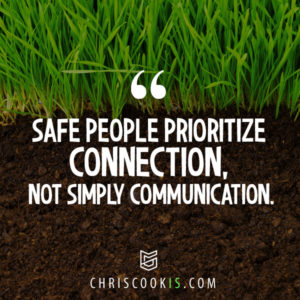There’s a reason some people are better at relationships than others. There’s a reason some people are surrounded by loyal friends and coworkers. And there’s a reason why—be it on a personal or professional level—some people just need some help perhaps because they’re lacking the know-how, or they are confused, tired, lonely, and feel totally isolated.
Maybe you’re one of those people. Years ago, in my insecure awkwardness, I definitely was. But there’s hope for change.
Intellectually, I’m confident most people see the value in healthy, meaningful relationships of all varieties. But somewhere along the line, lack of understanding and application of what causes a relationship to thrive at the very fundamental level creeps in and reduces a thriving relationship to one that is merely surviving.
I’m confident you know exactly what I’m talking about. Maybe for you, a romantic relationship is faltering. Or maybe, you feel unheard and invisible on your job. Worse, maybe you’re frustrated with the depth of quality friendships in your life.
Failing to understand what makes a great relationship is probably why we encounter a myriad of hangups, fallouts, and superficial tendencies on personal and professional levels. It’s why dating relationships crash and burn after a month of apparent paradise. And it’s why employees bury their heads in the sand of monotony and ambiguity after failing to make connection between their contribution and their company’s purpose, sold by their direct leader.
Boots on the Ground
Lately, I’ve been studying the science of relationships for a particular reason. Because people are the greatest asset in our lives, we all must become better at establishing connection, leading well, and building trust. In the last eight months, I’ve been entrusted with the oversight of leading a large team of people, with five people who work directly with me on a weekly basis. The extraordinary privilege in doing so has honestly led me to a place of self-awareness in auditing my ability to connect more than simply communicate; to demonstrate and earn trust over time versus theorizing about the need for trust; and to believe in people before they believe in themselves.
But relationship health in every sense begins with the correct environment for growth, much like a greenhouse.
The Greenhouse Effect
Greenhouses are transparent structures that allow light to reach the contents within. Apply that to relationships, and we could stop right there. Like a greenhouse, a successful relationship hinges upon transparency and light (truth). Greenhouses also provide protection from external threats. In like manner, relationships must be a safe place in which vulnerability and trust can thrive without the fear of one’s blindspots being exposed publicly.
Proverbs 4:23, a familiar verse, states, “Watch over your heart with all diligence, for from it flow the springs of life.” I used to think the implication was that we needed to carefully watch what enters our heart (which we need to do). But as I have taken time to study the verse in detail, the greater implication has to do with protecting the treasure inside from getting contaminated! And that is precisely the priority of creating a safe place within a relationship—that long-term health and growth would be a natural by-product of one’s investment.
What I’ve recently discovered is that there are six stages in the life of any relationship that are cultivated in the safety of a greenhouse environment—six stages that require intentionality and diligence.
Six Stages of a Relationship Greenhouse
- Safety. Safe people prioritize connection, not simply communication. Another way of saying the same thing is that there is a marked difference between hearing someone and listening to someone. Safe people are present in the moment. You know what a “present” person is if you’ve ever been in conversation with someone and their nonverbal and verbal communication lets you know that you are the central focus of their time and energy in the moment. Safe relationships, and safe people, are for us despite our blindspots, limitations, and mistakes. Quite opposite of a safe relationship are those by whom we experience shame and condemnation at the root of our interaction with them. They require us to be someone we are not in order to be accepted. And as a result, the relationship dynamic is reduced to a posture of fear and a reactionary disposition.
- Trust. Once the ground of a relationship is safe, the seeds of trust can grow. And this is so imperative to understand: trust isn’t verbalized; trust is exercised. We cannot tell people to trust us. That’s ridiculous. Trust is earned over time with congruence between words, intentions, and actions. One of the most nauseating aspects of poor leadership is when a leader makes promises, but has zero intention to proceed with follow-through. Moreover, because safety and trust are foundational to a healthy relationship, healthy confrontation acts as an opportunity to prune away destructive mindsets and behaviors that choke-out the potential for long-term growth and success.
- Honest Communication. When safety and trust create the soil of relationships, honest communication, bookended by transparency and vulnerability, thrives. Vulnerability allows us to be unashamed of our blindspots and deficiencies on the way to maturity and growth. I don’t know about you, but I’ve been in a few relationships in which communication lacked honesty, and as a result, attempt at connection felt like we were “spinning our wheels.”
- Authenticity. We live in a world that seems to examine our every move through a microscope. And in doing so, it’s very difficult to simply be ourselves for fear of rejection. But when we reject the pressure to fit into an out-of-shape cookie cutter mold of “same,” we’re free to accept ourselves for who we are today. As a result, the uniqueness of who we are contributes to the lives of those around us.
- Healthy Soil. Truthfully, safety, trust, honest communication, and authenticity sum to create the nutrient-rich soil in which growth in our lives can be sustained. Without that foundation, our growth will be stifled, short-lived, and unable to weather unpredictable obstacles and difficulties when they arise.
- Untainted, Sustainable Growth. Relationships with safe, trustworthy people who are committed to provide honest and authentic communication in our lives are rarely short-lived. All of my most important relationships are embodied by those very same characteristics. And the qualitative growth in those relationships is the greatest treasure in my life.
 Sadly, when those six stages of a relationship aren’t present, instead of creating greenhouses, we create silos: narrow, isolated chambers buried underground and covered by fear, shame, intimidation, and insecurity. Weak leaders often force their team members into silos. Beaten-down spouses create silos of independence within their marriages. And insecure friends create silos in which the relationship hinges solely upon that which is superficial.
Sadly, when those six stages of a relationship aren’t present, instead of creating greenhouses, we create silos: narrow, isolated chambers buried underground and covered by fear, shame, intimidation, and insecurity. Weak leaders often force their team members into silos. Beaten-down spouses create silos of independence within their marriages. And insecure friends create silos in which the relationship hinges solely upon that which is superficial.
Without healthy relationship greenhouses, we’re risking inviting self-criticism, paranoia, approval addiction, and pride to pollute our lives. Sadly, though, many people don’t realize this risk until time is up.
Discussion question: in the comment section below, answer the following: how is the health of your relationships? Where can you fortify them by creating a relationship greenhouse?




